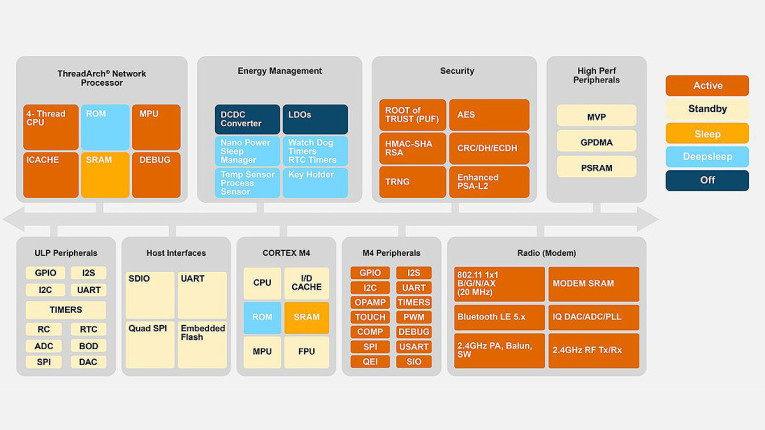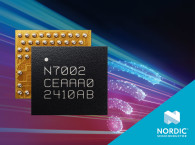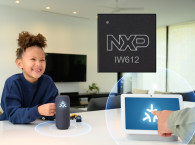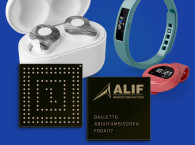In the opening keynote of Silicon Labs' annual Works With Developer Conference, Silicon Labs CEO Matt Johnson detailed how the era of the Internet of Things is here, and through its breadth of technologies, depth of expertise, and focus on the wireless market, Silicon Labs has ascended to the leadership position in "pure-play IoT."
When will companies understand that "IoT" is such a cliché, and a meaningless term? It certainly doesn't resonate with consumers, who tend to associate it with industrial, corporate, and privacy-invading applications. Associating "IoT" with smart home and consumer technologies is not helpful. But apparently Silicon Labs is still determined to needlessly carry that burden.
"By 2025, it's estimated that there will be 27 billion connected IoT devices, roughly three or four devices per person on the planet," said Silicon Labs CEO Matt Johnson. "By focusing our Series 2 product offerings and roadmap on connectivity, interoperability, power efficiency, and security, Silicon Labs is positioned to be in each and every one of those devices."
The mentioned Series 2 SoC family was developed under the premise that as the "IoT" matured, instead of looking for point solutions, the market would be looking for platforms that combine hardware, software, security, tools, and support. The prediction has proven true, and Silicon Labs has nearly doubled its revenue associated with connected systems since the first member of the Series 2 family debuted in 2019.
Now, Silicon Labs builds on the success of Series 2 with the expansion of the family to include new products, including complete Matter development solutions providing support for Matter over Wi-Fi, Matter over Thread, Bluetooth Low Energy (LE) commissioning, and Matter bridges to Zigbee and Z-Wave. All these are expected to be available on time for the predicted release of Matter 1.0 before the end of 2022.
Silicon Labs is also announcing solutions to support Amazon Sidewalk, something that Amazon says is doing no one knows why, introducing another proprietary low-bandwidth long-range wireless communication protocol that uses Bluetooth Low Energy for short distance communication, and 900 MHz LoRa and other frequencies for longer distances. Something the world really doesn't need.
More relevant is a new flagship SoC and power amplifier for Wi-SUN, the Silicon Labs FG25 SoC and EFF01 Front End Module (FEM), respectively, which when used together, are designed to provide a sub-gigahertz (GHz) transmission range of up to 3 kilometers in dense urban environments with no data loss. Wi-SUN is a mesh protocol for smart meters and energy monitoring in smart cities, according to the IEEE 802.15.4g standard, promoted by the Wi-SUN Alliance.
Finally and most importantly for the audio industry, Silicon Labs introduced its first Wi-Fi 6 and Bluetooth LE SoC family, starting with the SiWx917 chip, designed to be the lowest power Wi-Fi 6 and Bluetooth LE combination SoC in the industry.
The SiWx917 is a fully integrated SoC designed to deliver exceptional compute power, faster machine learning processing, best-in-class security, enough memory to run wireless stacks and applications, and ultra-low current consumption for long battery life. This can help users reduce development costs and device footprint, future-proof their applications, and accelerate time to market.
In addition to the device's Wi-Fi 6 support for high-performance in dense wireless environments, it includes a dual-core architecture, a quad-thread ThreadArch processor for wireless connectivity, and an ARM Cortex M4F for user application processing. It also integrates embedded SRAM, FLASH, an AI/ML accelerator, an enhanced PSA Level 2 certifiable security engine, and a power management subsystem in a single 7x7 package.
The SiWx917 supports OFDMA, MU-MIMO, BSS coloring, and other features that enable higher bandwidth and improved network efficiency in crowded environments, which allows for faster, more stable network coverage. With its ultra-low power capability and support for Wi-Fi 6’s Target Wake Time, allowing devices to sleep for longer periods, it can enable multi-year operation for battery-based designs such as smart locks or smart sensors. With Bluetooth LE in the same chip, the SiWx917 also supports simple device commissioning that can significantly reduce the time it takes to deploy new devices, at home or in commercial and industrial environments where the devices can number in the thousands.
Matter Development Solutions
One of the biggest drivers for the new era of connected devices will be the Matter 1.0 standard, which will provide a unifying application layer to bring together multiple smart home ecosystems. To accelerate the adoption of Matter and to fulfill that vision, Silicon Labs announced a portfolio of hardware and software Matter solutions that provide complete, end-to-end Matter development kits for all ecosystems and wireless protocols.
According to Ravi Subramanian, Director, Wi-Fi Product Marketing at Silicon Labs, this represents a massive market for designers and developers, while also introducing new requirements and expectations from users. Advanced battery-powered devices, like smart door locks, cameras, sensors, and cleaning robots that can navigate around obstacles in a home require addressing power consumption as part of the end-device development equation. In addition, with most existing Wi-Fi devices using the 2.4 GHz spectrum, the network is becoming crowded with devices that reduce performance in high-density areas. Finally, users are also looking to consolidate and be able to control all of their devices from one hub, ideally a single app, phone, tablet or console, so the next-generation of Wi-Fi devices must also be future-proofed for Matter. Wi-Fi 6 helps address these challenges with new features such as OFDMA, MU-MIMO, beamforming, BSS coloring, and Target Wake Time, to name a few.
A central component of the Silicon Labs development platform is the 2.4 GHz wireless MG24 SoC for Bluetooth and multiple-protocol operations that supports Matter over Thread as a single-chip solution. The MG24 has an effective range of up to 200 meters indoors for OpenThread while enabling Bluetooth commissioning of new devices on the same chip. When the MG24 is combined with the low power Silicon Labs RS9116 Wi-Fi product, it enables development of Matter over Wi-Fi 4 with an easy transition to Silicon Labs' Wi-Fi 6 single-chip Matter SoC in 2023.
The MG24 Matter-ready SoC, RS9116 Wi-Fi SoC, the multiprotocol Unify SDK, Simplicity Studio, and the Gecko SDK are available now for developers and designers to begin designing Matter-ready products using the wireless protocol of their choice. The new Matter-ready SiWx917 SoC was also developed to radically reduce the energy consumption in Wi-Fi connected devices, while delivering more compute, faster AI/ML, and robust security to solve the challenges of the future. The SiWx917 is currently sampling, with general availability anticipated in early Q3 2023.
www.silabs.com







